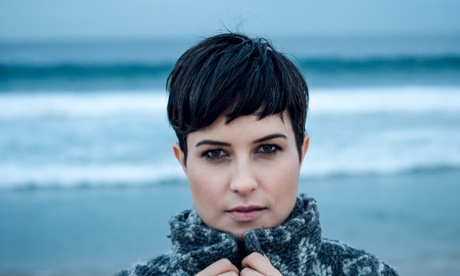
It’s perhaps unfortunate that Missy Higgins chose to publicise her latest venture, Oz – an album’s worth of Australian cover versions, augmented by a book of essays explaining her connection to the songs – with her reading of the Drones’ tumultuous Shark Fin Blues.
The original, which was voted greatest Australian song in a poll of contemporary Aussie songwriters in 2009, is caustic, acerbic and supremely bitter. Gareth Liddiard’s voice is laden down with the weight of the blues and his disgust at contemporary life. On the original, the guitars writhe and bite like fighting snakes.
Missy Higgins has removed the guitars, added some very tasteful piano and backing vocals, and allowed space and sunlight into the claustrophobia. She’s given it room to have a think about its anger. She’s prettified it. And it is so wrong. Adult contemporary rock brought to a form that never deserved it.
Likewise the song that follows on this 15-track album – a polite reading of The Go-Betweens’ Was There Anything I Can Do (taken from the Brisbane band’s sumptuous 1988 album 16 Lovers Lane). The original might have felt gentle, but it layered hidden intricacies and ebbs and swells of emotion beneath the surface. Higgins replaces these with a drawn-out beat and the occasional elongated vowel.
As I say, unfortunate – because, in the main, Higgins’s fourth studio album is a likeable and well-intentioned affair, whose opening tracks give a false impression. Far better to listen to her upbeat, playful version of Sydney songwriter Perry Keyes’ observational and humorous NYE or the spirited string-laden Amanda Palmer duet that carols through Paul Kelly’s Before Too Long, which capture her clear joy and love for both her country and her country’s music.
She also gets under the skin of a second Paul Kelly cover, Everybody Wants To Touch Me, wailing and mourning in a way she doesn’t manage elsewhere. And her take on The Blackeyed Susans’ Curse On You, with James Bond-esque refrain, is charming enough.
A collection of covers is always an ambitious undertaking. You run the risk of having your versions compared to the originals, and if you (as an artist) have any regard for the originals whatsoever – and presumably you do, otherwise why else would you have picked them? – then you’re on a hiding to nothing. Early in an artist’s career, cover versions can be the standout in the live set because here are the songs they’ve grown up with, lived with and breathed. Can the same apply to an entire 15-song set, many of which were sought out for this very project?
In her book, Missy Higgins argues – often persuasively – that it can. “Something about Paul [Dempsey]’s lyrics on that record spoke directly to my teenage angst, my despair at not understanding my place in the world, my introspective and (sometimes) depressive nature,” she writes about Something For Kate’s You Only Hide, a cover of which opens the album. “Music can be such a friend during those times.”
Oz, the book, is wonderful. Without the benefit of her never prosaic explanations, the album’s cover versions often pale next to the originals. With them, she breathes hidden life into her music. She imparts the gift of intention. I suspect I ain’t never going to love her version of Shark Fin Blues, but I can certainly empathise with her love for The Drones.
“The Drones did a version of River Of Tears … I’d never heard anything like the way Gareth [Liddiard, Drones singer] sang it,” she writes. “He sang and played like his very existence depended on it: writhing against his guitar, strangling its neck as though it was the instrument through which the demons would be exorcised from his body, spitting out every word into a bended microphone.”
In print, she comes across as personable, enthusiastic and genuine (particularly in a killer essay on The Divinyls’ Chrissy Amphlett that is crying out to be reprinted in its entirety). I’m not questioning her sincerity, just her interpretative ability.
The stripped-back reading of Slim Dusty’s The Biggest Disappointment – a duet with another featured artist Dan Sultan – is pretty cool though. Her voice retains much of the intimacy that endeared Missy Higgins to her fans in the first place. And in the singer’s favour, most of the songs here are recognisable as Missy Higgins, although I can do without her chirpy take on The Warumpi Band’s pivotal Blackfella/Whitefella, even with its warm guest vocal from Alice Springs’ Crystal Itjuwalyi Butcher.
Having Missy Higgins cover a series of widely disparate songs in her trademark style leads to an unintentional levelling off, a flattening of variety. Whether this is to the album’s detriment will come down to how much you like Missy Higgins. There’s a genuinely beautiful (albeit tastefully histrionic) version of former Cold Chisel songwriter Don Walker’s The Way You Are Tonight to close the album out. And there are three words I didn’t think I’d ever type in the same sentence: Cold Chisel and beautiful.
But, as Higgins writes: “This song sounds like a classic. It feels like it could have been written in the 30s and sung by all the greats: Sarah Vaughan, Ella Fitzgerald, Billie Holiday... that’s why we couldn’t change it too much. Almost every other track on this album was flipped inside out, but this one couldn’t be tampered with.”

